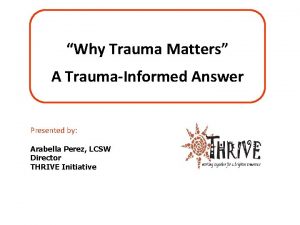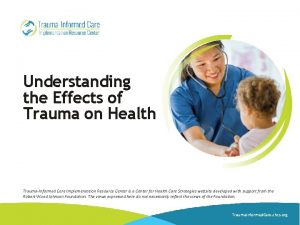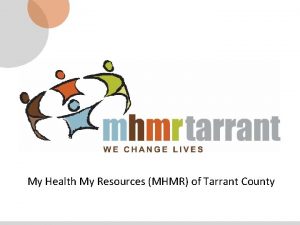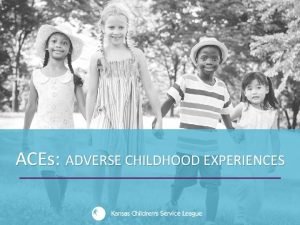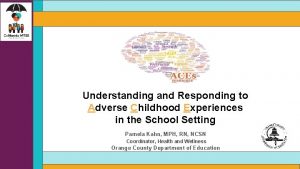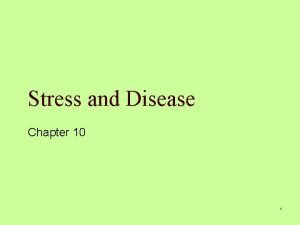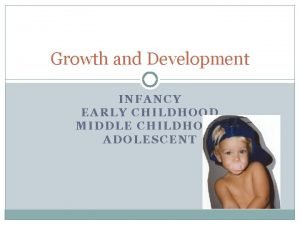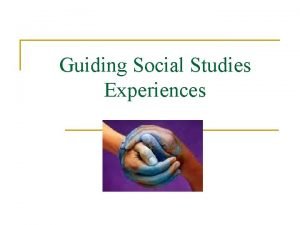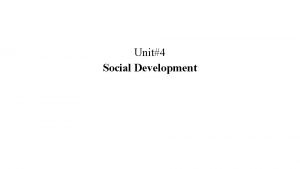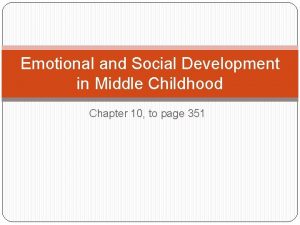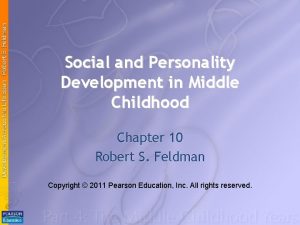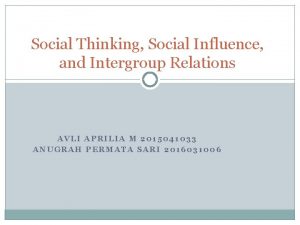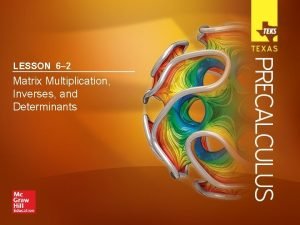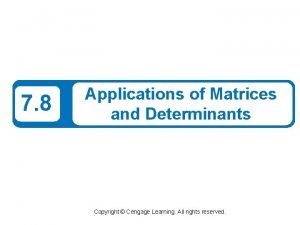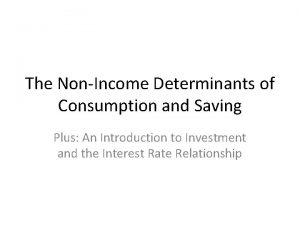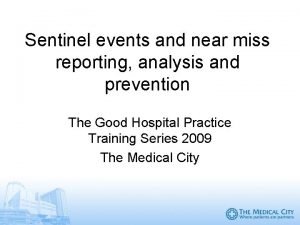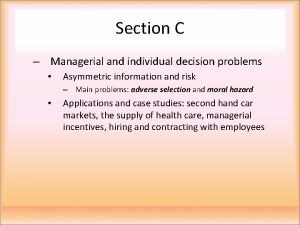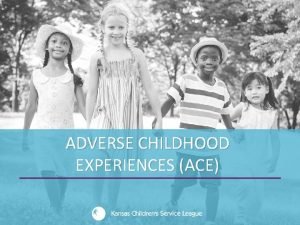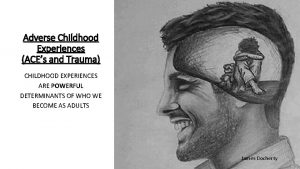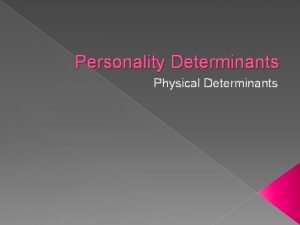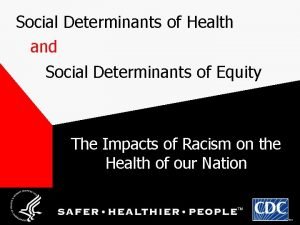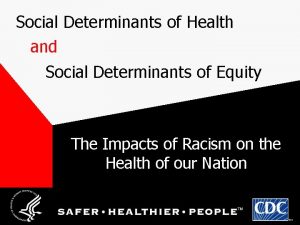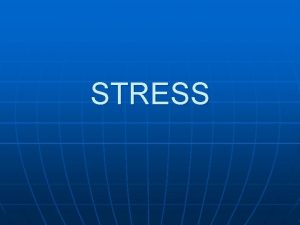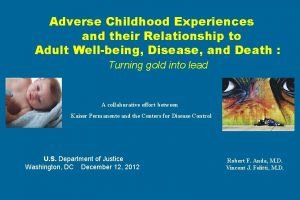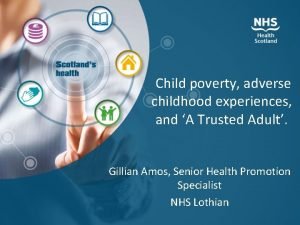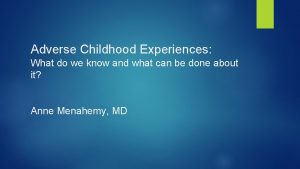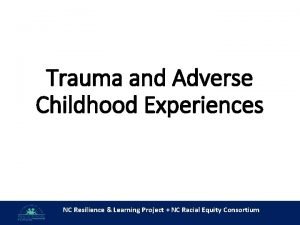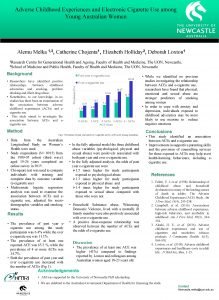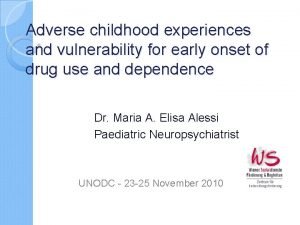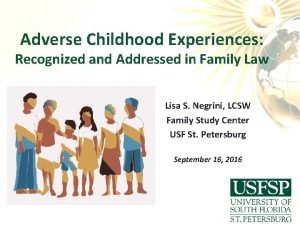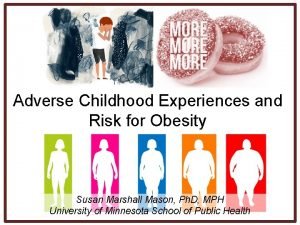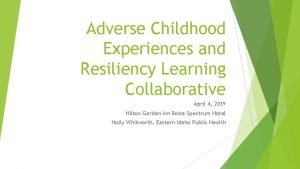Childhood Stress Social Determinants and Adverse Childhood Experiences

























- Slides: 25

Childhood Stress – Social Determinants and Adverse Childhood Experiences Why Should We Screen and What Should We do? Mark Minier, MD Amanda Osta, MD Stacy Laurent, DO Anthony Heard, LCSW

Objectives • Identify sources of stress in childhood • Understand the link between childhood stress and health outcomes • Gain confidence in our team’s ability to effectively identify, assess, and support stress in our patients • Discuss new screening tool and roles we all play in getting this accomplished • Review the referral process based on screening results

Sources of Stress for Children • Adverse Childhood Experiences (ACEs) • Unmet Social Needs (Social Determinants of Health)

Adverse Childhood Experiences Study • Abuse • Emotional • Physical • Sexual • Neglect • Emotional • Physical • Household Dysfunction • Mother treated violently • Household substance abuse • Household mental illness • Parental separation/divorce • Incarcerated household member Felitti, Am J Prev Med 1998 Note- Did not include other violence, poverty, bullying, loss of a parent

ACEs Score = Trauma “Dose” • ACEs were common and tended to be grouped together ACE Score Prevalence 0 1 2 3 4 or more 33% 26% 10% 16%

How does your ACE dose affect your health? • ACE score of 6 or more led to a 20 year decrease in life expectancy • Children with and ACE score of 4 or more had 4. 5 x increased risk of asthma • 51% of children with ACE score of 4 or more have learning or behavior problems (compared to 3% of kids with ACE of zero)

Social Determinants of Health • In Chicago, 1 in 3 children live in poverty • Social Determinants of Health include: • • Parental employment Parental education and literacy Childcare Employment Food security Housing Legal aid Ability to pay utilities • Data show that unmet social needs can have large impacts on health outcomes and health behaviors

Toxic Stress • Long term exposure to “stressful” environments can lead to poor outcomes, including behavior and mental health issues • Can lead to changes in your DNA and genes • We need to identify and address “stressful” environments early • If we don’t ask, we will never know

Clinical Manifestations Behavioral Outbursts Social withdrawal/Mood swings Irritability/mood swings Developmental delays Transient regression of behavior (bed wetting) • School difficulties, underachievement • Verbal/physical altercations • Psychosomatic complaints • • •

Resilience • Process of moving through a traumatic event utilizing protective factors for support • Critical for successfully navigating through stressful events • Serves as a buffer between the child and the events, possibly mitigating the negative effects • Again, if we don’t ask we won’t know about these toxic or stressful events • Gives us the opportunity to identify protective factors for both the patient and the family as well as provide support


Assessing Social Key Questions for Health: The ASK Questions For Health Study A collaboration between:

ASK Questions for Health: QI and Study • Quality Improvement • • ASK Survey We will begin XXXXX ASK survey will be inserted in the WCC Patient Education packets ASK survey is in English and Spanish • Study • How common are unmet social needs and ACEs in our population • What do parents think of this new screening tool • What do YOU think about this new screening tool

Exclusion Criteria for Study Component • Patients unaccompanied by a parent or guardian • Patients whose parent or guardian is not able to read the ASK survey in English or Spanish

ASK Survey Social Needs ACEs

ASK Study Packet – 4 items #1 #2 Study Cover Letter Information Sheet

ASK Study Packet – 4 items #3 #4 Family Satisfaction Survey Demographic Survey


Customer Service Representatives • Hand out the WCC Patient Education packet for all patients coming in for a Well Child Check • The packet will have the new ASK survey already included (both English and Spanish packets)

Medical Assistants • Only for children presenting for a WCC in the COC clinic (this is only for resident COC patients, NOT FPG patients) • Give the parent/caregiver a packet with the following items (4 items): • Study Cover Letter • Information Sheet • Demographic Survey (to be completed by the parent in the waiting room or exam room before the visit) • Family Satisfaction (to be completed at the end of the visit) • Tell parent/caregiver that we are doing a study and if they would like to participate they can read the information on the cover letter and proceed. If any questions they can ask their provider.

Providers • Resident physician will review the ASK and document any referrals needed on the ASK (bottom of the page) and will document the ASK results and follow-up in their Cerner note • Resident physician will collect the Demographic Survey from the parent/caregiver • Resident physician will collect the Family Satisfaction survey • The following items will be placed in a secure lock-box in the attending room: • Demographic survey (patient label) • Family Satisfaction survey • ASK questionnaire (patient label)

Referral Process • If a referral is needed: • Access resources here: http: //go. uic. edu/ask And/or • Requires immediate social work consult • Provider will communicate directly with SW regarding urgent concerns • We will be tracking SW referrals to see if there is a significant increase

- Give the Parent/Caregiver the WCC Patient Education packet (only for WCC appts) In Review… - Hand the Family/Caregiver the ASK Study Packet - Explain that they can read the cover letter and information sheet and fill out forms when they are in the waiting room/exam room before provider sees the patient - Direct questions to the provider ASK Study Packet - Review the ASK Make necessary referrals or provider education from website Document at bottom of ASK and in Cerner Look to see if patient completed the ASK Study Packet Affix labels as appropriate Place all documents in the lockbox

Is this working? How is it affecting clinic flow? ASK Screening Tool Started 2 months Staff Feedback Survey • Clinic flow • Wait times • Increased demands Modifications made/Suggestions addressed 6 months 4 months Staff Feedback Survey • Clinic flow • Wait times • Increased demands Modifications made/Suggestions addressed

Questions or Concerns • If you have any concerns or questions please contact: • • Mark Minier, MD Amanda Osta, MD Stacy Laurent, DO Anthony Heard, LCSW
 Adverse childhood experiences study
Adverse childhood experiences study Adverse childhood experiences study
Adverse childhood experiences study Mhmr of tarrant county
Mhmr of tarrant county Adverse childhood experiences powerpoint
Adverse childhood experiences powerpoint Slidetodoc.com
Slidetodoc.com Engineering vs true stress strain curve
Engineering vs true stress strain curve Chapter 10 stress responses and stress management
Chapter 10 stress responses and stress management Principles of growth and development
Principles of growth and development What are the 6 main social determinants of health?
What are the 6 main social determinants of health? Social determinants of personality
Social determinants of personality Social determinants of aggression
Social determinants of aggression Axial normal stress
Axial normal stress The importance of social sciences
The importance of social sciences Social development in infancy and childhood
Social development in infancy and childhood Social and emotional development in middle childhood
Social and emotional development in middle childhood Damon's stages of friendship
Damon's stages of friendship Social thinking adalah
Social thinking adalah Social thinking social influence social relations
Social thinking social influence social relations Matrix multiplication inverses and determinants
Matrix multiplication inverses and determinants Applications of matrices and determinants
Applications of matrices and determinants Personality structure meaning
Personality structure meaning Kramer formulasi
Kramer formulasi Non income determinants of consumption and saving
Non income determinants of consumption and saving Adverse reaction definition
Adverse reaction definition Near miss examples
Near miss examples Adverse selection
Adverse selection
